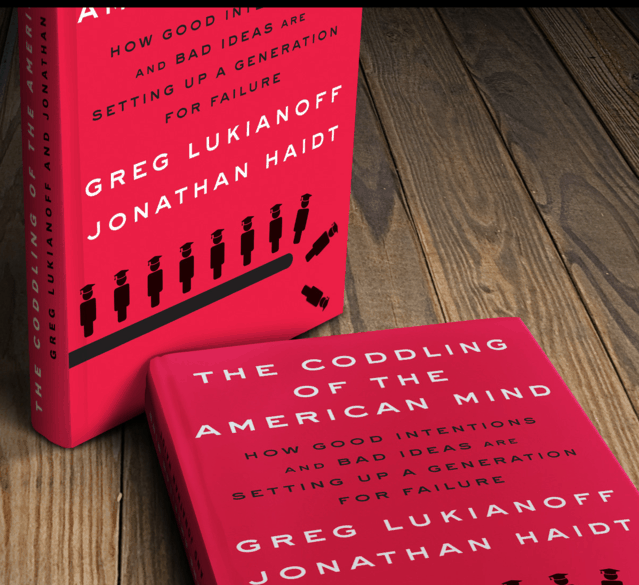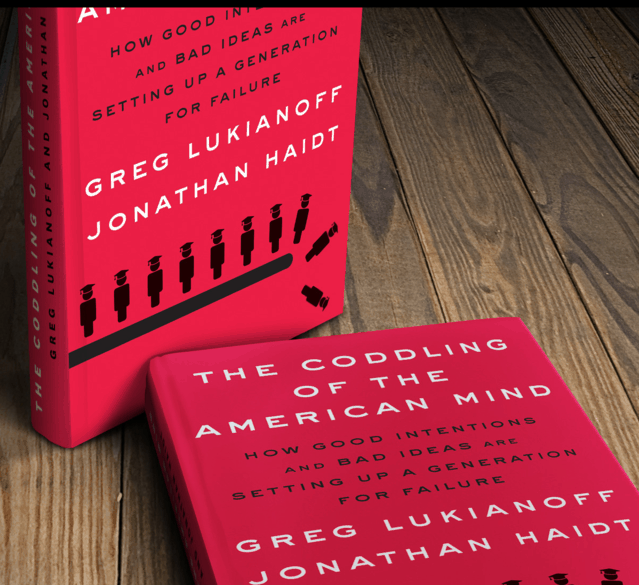
In the dispute over free speech in the United States, liberal intellectuals accuse the left of feeling immediately threatened if contradicted. “Safetyism” is the concept of the fight.

The question of what can be said in public at all is not new. In May 1972, the comedian George Carlin caused trouble when he told the audience in Santa Monica, California, what “seven dirty words” you shouldn’t utter on U.S. television (they were expected phrases from the Areas of sexual practices, genitals, and feces). When Carlin repeated the number two months later in Milwaukee, the local police arrested him for fornication. The limits of freedom, Carlin was able to show with this pure provocation, are sometimes merely where state-sanctioned prudishness begins.
In 2020, the debate in the United States has a different turn. It is not the state that is accused of censorship, but rather grossly: the progressive left. And it’s not about a few dirty words, but – if you follow those who accuse the left or at least warn against their supposed methods – about the end of liberal society.
In the past few weeks, numerous well-known intellectuals have warned very publicly that freedom of speech is particularly threatened, but not only in the United States. Open letters were written, dismissals were submitted, even new platforms were founded, as a kind of liberal resistance – all with the more or less the same message that moral zeal from the left prevented the free exchange of views. There is talk of a new McCarthyism, a new orthodoxy, of Cancel Culture, of Neopuritanism, and even civil war.
Who feels threatened, who is threatened?
In a term that is still little used, the ideological conflicts are particularly condensed; it reads safetyism. “When confronted with words, ideas, or decisions that displease them, more and more people claim to be at risk of suffering psychological or even physical harm,” writes author Emily Yoffe in a text-based on that of the political scientist.

When the New York Times published a guest post by Republican Senator Tom Cotton in early June calling for U.S. military action against Black Lives Matter protesters domestically and protesting against this article within the newsroom, Bari threw himself White; there’s a columnist for the Times, those colleagues on twitter as well safetyism ago. In her publicly distributed letter of dismissal, the more conservative Weiss later described an allegedly poisoned atmosphere in the newspaper. Different points of view, like hers, would be answered with reductions or silenced by self-censorship.
Weiss recommended the book that coined the term safetyism in 2018 for reading a few months ago: The Coddling of the American Mind by social psychologist Jonathan Haidt and lawyer Greg Lukianoff. ” Safetyism is the cult of security, “said the two authors. In their book, they show that many universities in the United States have developed a climate where feelings have become more important than arguments. One of the book ‘s central theses is: The constant References to suffered traumas and the demand for trigger warnings would result in students shielding themselves from other opinion worlds more and more aggressively, making them incapable of arguing and prone to staging victims.
Haidt and Lukianoff jump from anecdote to study to analyze in their book. It’s about overprotective parents, the side effects of social media and the increasing spread of anxiety disorders and depression among young people; it’s about the supposed dangers of intersectionality and identity politics, supposed witch hunts against professors; the inflationary use of the concept of violence in the eyes of the two authors, the advantages of cognitive-behavioral therapy and much more.

The most exciting thing about The coddling of the American Mind is but perhaps – as the Harvard professor Moira Weigel is a critique in the Guardian expounded two years ago – what is young in this book for mental state U.S. Nationals not go. There is no mention of their massive debt from tuition fees, the dramatic underpayment in education, or the lack of jobs for young professionals in many industries. Ultimately, the economic conditions of the object “young Americans” are entirely ignored. The Coddling of the American Mind should be a plea for fact-based debate culture but omits crucial facts.
This lack seems to have harmed the book’s popularity. This is probably because it combines two of the constant criticisms on the left: too soft and too hard, too sensitive and too authoritarian. It is no wonder that safetyism has since become a popular trope for many conservatives and liberals. It has been repeated in several articles, columns, and lectures and has been intensified in recent weeks.
One could rightly hook up at this point and ask if the excitement is not a bit exaggerated. The answer is yes, and no.
Yes, because a debate about the culture of the discussion does seem to be far from the real problem, especially in the United States. The corona pandemic is raging here in an almost incomparable way with nearly 150,000 fatalities; Around 30 million U.S. citizens are currently receiving unemployment benefits; the short-term recovery on the job market after the drastic waves of layoffs at the start of the lockdowns seems to be over; For nine weeks now, people across the country have been protesting racism and police violence every day, while Trump has sent federal officials to alleged unrest cities, against the will of the local mayor. Security is currently an existential issue in the United States on many levels other than free speech.
No, the debate does not matter, because the discussions about freedom of speech and the threat to democracy do not only take place in theory but also solidify. So if numerous intellectuals who mostly understand themselves as liberal in the American sense give the impression that “open society” is threatened not only from the right, but equally from the left, and safety is one of the central problems, then one can take it seriously.
The real consequences of what is written
Whose security is this really about? And whose fears are cultivated in this debate?
Let us take the case of James Bennet, which shows how inconsistent the accusation of safetyism is. Bennet, head of the New York Times ‘ opinion division for four years, resigned in June after days of internal and public discussions about the Cotton article. More than 1,000 employees of the newspaper are said to have signed a letter stating, among other things, that the publication of the Cotton text jeopardizes the task of the Times journalists to work ” safely and effectively. ” A Times spokeswoman said the opinion contribution did not “meet the standards” of the house, without specifying the violation of the text. For many, confirmation that the most famous newspaper in the western world no longer allows” controversial “comments.
It is noteworthy that those who were supposed to welcome the open debate according to their liberal principles were bothered by the article’s intense contradiction. And how does it fit that, according to The Coddling of the American Mind, speech acts can never be violent, but it should have been Twitter mobs that would have forced a very established journalist to quit (so the Times had to don’t quit Bennett)? Above all, however, the question arose why the publication of a text calling for the deployment of the U.S. military against demonstrators inside should not have any consequences for those responsible – if the possible fulfillment of the requirements of this text should have positive ramifications for could have many citizens.
How cheap this distinction is made clear by black employees of the New York Times, in which they pointed out that they are not only journalists but are also affected differently from state violence than their white colleagues when in doubt. A criticism, by the way, that they took a high risk. The newspaper’s social media guidelines explicitly prohibit “taking sides.”
Another case: Around 150 established intellectuals published in early July – including writer JK Rowling, political scientist Mark Lilla and critic Thomas Chatterton Williams (who praised The Coddling of the American Mind in a 2018 review for the New York Times ) – an open letter in the renowned U.S. magazine Harper ‘s. In this, they denounced “intolerance towards dissenters.” The text has been translated into several languages and published by various media. And there was a counter letter, in which many of the vague – one could also say: emotional – allegations of the original message were deconstructed.
The criticism of an editor of the online magazine Vox.com, Emily VanDerWerff, caused a lot of attention. She shared a letter on Twitter that she had previously sent to her bosses. In it, she expresses her disappointment that one of her colleagues, Matthew Yglesias, has signed the Harper ‘s-Letter heard: “Of course Matt has a right to his own opinion,” wrote VanDerWerf, “and I know that he is a more sophisticated thinker than the signing of this letter suggests.” VanDerWerff said that he was signed by “several prominent anti-trans votes,” which is why she feels less safe at work because of her colleague’s involvement. VanDerWerff emphasizes that she does not want Iglesias to be sanctioned in any way, but instead wants to point out the consequences for her.
VanDerWerff was not only showered with death threats and insults, which did not confirm the fears that she expressed in the letter to her employer, but did so for the public sphere. VanDerWerff was also criticized for overstating their “security” requirements.
Where does a threat start?
If VanDerWerff’s reasoning becomes a principle, Yascha Mounk warned in the podcast of Vox.com-Co-founder (and thus bosses of VanDerWerff) Ezra Klein; public discourse will hardly be possible in the future. The right to free speech and the right to security are legitimate concerns, said Mounk, but in case of doubt, the former is preferable to the latter. Otherwise, free speech would be “cut in an unpredictable and arbitrary way.” He felt great sympathy for the protection needs of people who would be threatened due to their belonging to marginalized social groups, said Mounk. But the argument that one’s security is at risk is already used if the only opinion is expressed that does not correspond to one’s own. Previously the expression of a different view is seen as a threat.
The contrast that the critics of safetyism want to open is as follows: They, the liberal intellectuals, are demanding a space where they can contradict themselves freely and reasonably without anyone having to fear the consequences. They call for the continued existence of an (idealized) marketplace of ideas: may the best arguments win. The others, however, the left? Radicals? Boys? – tried to narrow this space so that it remained cozy for them, and they did not have to endure a contradiction.
But you could also look at it differently: you, the liberal intellectuals, have laid down rules for what you consider to be free debate, thereby creating a space in which you have previously felt very secure. However, anyone who questions these rules because they do not work the same for everyone, have never worked – so who disagrees – quickly reaches the limits of the “free debate.” Those who have not yet been established in the discourse are then happy to assume that they wanted to cancel the older adults, so that they are silenced, and rob not only of their symbolic power but also of their economic foundations: Those who are no longer allowed to express an opinion can no longer earn money with it, one to have. (Or, like Bari Weiss, voluntarily goes in search of another business model.)
Security and freedom are subjective concepts.
The positions in this debate seem hardened. For a rapprochement, one would have to say goodbye to the idea that there can be something like a fixed order for discourse. Security and freedom are far too fluid and subjective concepts to function as static opposite poles.
It would be more essential to deal with the constellations of power, structurally, and on a case-by-case basis. For an editor who, as a trans person, not only fights insults on Twitter but also that the state accepts her fundamental rights, the debate has been less free from the start than for a white Cis man who publishes in renowned magazines.
If you look at how the representatives of the liberal middle make themselves outsiders, how they make safetyism , cancel culture and leftist attempts to interpret them a threat – in the USA, horseshoe theory is just as popular as in Germany – it seems increasingly clear what it is about probably going to the core. For a center that is so afraid of losing power that it would instead protect its position in the “free exchange of information and ideas” (as the wording in the Harper’s letter says) instead of creating it for everyone. Everyone has the right to freedom of expression in this idea. Whoever hears whose concerns are taken seriously is another question.
